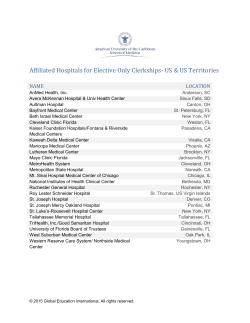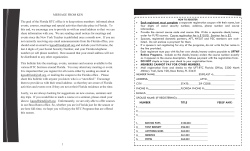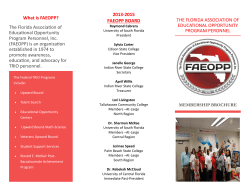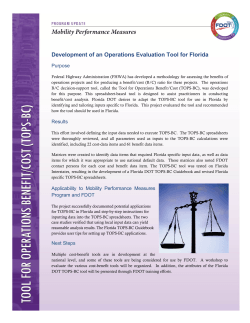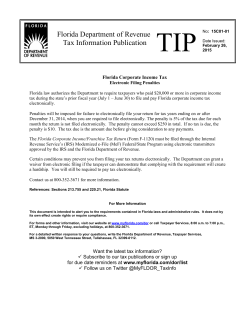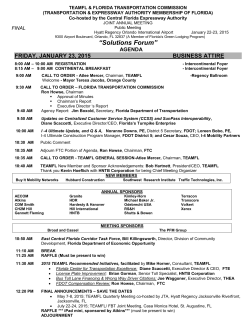
OPERATIONS RESEARCH - Florida Institute of Technology
GRADUATE PROGRAM OVERVIEW OPERATIONS RESEARCH MASTER OF SCIENCE DOCTOR OF PHILOSOPHY DEPARTMENT HEAD V. Lakshmikantham, Ph.D. ASSOCIATE HEAD Michael D. Shaw, Ph.D. PROFESSORS Jewgeni H. Dshalalow, Dr. Sci. V. Lakshmikantham, Ph.D. Syamal K. Sen, Ph.D. Muzaffar A. Shaikh, Ph.D. Wade H. Shaw Jr., Ph.D. ASSOCIATE PROFESSOR Michael D. Shaw, Ph.D. PROFESSOR EMERITUS Frederick B. Buoni, Ph.D. Operations research is a scientific approach to analyzing problems and making decisions. It uses mathematics and mathematical modeling on computers to forecast the implications of various choices and identify the best alternatives. Operations research methodology is applied to a broad range of problems in both the public and private sectors. These problems often involve designing systems to operate in the most effective way. Many problems deal with the allocation of scarce human resources, money, materials, equipment or facilities. Applications include staff scheduling, vehicle routing, warehouse location, product distribution, quality control, traffic light phasing, police patrolling, preventive maintenance scheduling, economic forecasting, design of experiments, power plant fuel allocation, stock portfolio optimization, cost-effective environmental protection, inventory control and university course scheduling. Operations research is interdisciplinary and draws heavily from the mathematics program. It also uses courses from computer science, engineering management and other engineering programs. MASTER OF SCIENCE DEGREE PROGRAM The Master of Science in Operations Research offers concentrations that emphasize those areas of application most in demand in today’s job market. Graduates have skills that include probability and statistics, deterministic and stochastic models, optimization methods, computation and simulation, decision analysis and the ability to effectively communicate with clients and managers. In addition, graduates have a breadth of knowledge that allows them to work in teams, interacting with people who bring different expertise to a problem. All areas involve expertise with standard computer software packages. ADMISSION REQUIREMENTS An applicant for the master’s program in operations research should have an undergraduate major in a science or engineering discipline that requires a significant amount of mathematics. Business majors with strong quantitative backgrounds are also encouraged to apply. A proficiency in mathematics covering topics in calculus and linear algebra, and computer literacy must be demonstrated by testing or suitable course work. General admission requirements and the process for applying are presented in the Graduate Information and Regulations section of the University Catalog. DEGREE REQUIREMENTS The master of science degree can be pursued with either a thesis or nonthesis option; each requires 33 credit hours. Under the thesis option, up to six credit hours of thesis may be granted in place of electives toward the required 33 credit hours and an oral defense is required. The nonthesis option requires a comprehensive examination. Courses taken to satisfy admission prerequisites cannot be counted toward the degree requirements. CURRICULUM The program’s curriculum is designed to provide breadth with some flexibility to accommodate the diversity of backgrounds typically found in an operations research program. Greater flexibility is provided for the elective courses beyond the core. A student has the choice of developing greater depth in one area of specialization, aiming at eventual research in that area, or continuing to develop breadth across more than one area. By choosing courses in a related field of application, students can prepare for careers in specialty areas such as management science, actuarial science or economic modeling in addition to conventional areas of operations research. Each student will complete a program plan that satisfies the requirements listed below, subject to approval of the adviser and program chair. Substitutions are sometimes permitted. Core Courses (12 credit hours) MTH 5411 Mathematical Statistics 1 ORP 5001 Deterministic Operations Research Models ORP 5002 Stochastic Operations Research Models ORP 5010 Mathematical Programming or ORP 5003 Operations Research Practice Restricted Electives (9 credit hours from the following list) MTH 5051 Applied Discrete Mathematics MTH 5102 Linear Algebra MTH 5401 Applied Statistical Analysis MTH 5412 Mathematical Statistics 2 ORP 5020 Theory of Stochastic Processes ORP 5021 Queuing Theory Computation/Computer Science Elective (3 credit hours from the following list) CSE 5100 Data Structures and Algorithms CSE 5210 Formal Languages and Automata Theory CSE 5211 Analysis of Algorithms CSE 5290 Artificial Intelligence CSE 5610 Computational Complexity MTH 5301 Numerical Analysis MTH 5305 Numerical Linear Algebra MTH 5320 Neural Networks ORP 5050 Discrete System Simulation Free Electives (9 credit hours) Nonthesis option Three courses in areas of interest to the student as approved in the student’s program plan. Thesis option At least one course plus up to six credit hours for a thesis. The thesis should be an in-depth study of some topic and/or problem in operations research, subject to the approval of the thesis committee. DOCTOR OF PHILOSOPHY DEGREE PROGRAM The doctor of philosophy program provides a more advanced level of education, as well as demonstrated ability to perform independent research. These additional strengths should qualify the graduate for vital positions of leadership in industry, business, government and academia. College of Science Department of Mathematical Sciences 150 West University Boulevard Melbourne, Florida 32901-6975 (321) 674-8091 http://cos.fit.edu/math GA-249-506 Page 1 of 2 ADMISSION REQUIREMENTS An applicant for the doctoral program will normally have completed a master’s degree in operations research or a related discipline. If the master’s degree is not in operations research, then the student will be required to take the core courses for Florida Tech’s master’s degree in operations research. These courses may be used toward fulfilling the credit requirements for the Ph.D. in operations research. Students also will be required to take a written qualifying examination equivalent to Florida Tech’s master’s comprehensive examination. General admission requirements are discussed in the Graduate Information and Regulations section of the University Catalog. OPERATIONS RESEARCH FINANCIAL AID Graduate student assistantships for instruction and research are available to well-qualified master’s and doctoral degree students. Assistantships carry stipends plus a tuition waiver. In some cases, a tuition waiver alone may be awarded for a limited amount of service. Assistantships for master’s degree students are normally for an academic year; assistantships for doctoral students are renewable on a yearly basis. THE UNIVERSITY Florida Institute of Technology is a distinctive, independent university, founded in 1958 by a group of scientists and engineers to fulfill the need for specialized, advanced educational opportunities of Florida’s Space Coast. Florida Tech is the only comprehensive, independent scientific and technological university in the southeast. Supported by both industry and the community, Florida Tech is the recipient of many research grants and contracts, a number of which provide financial support for graduate students. LOCATION Melbourne is located on the central east coast of Florida. The area offers a delightful year-round subtropical climate and is 10 minutes from the ocean and beaches. Kennedy Space Center and the massive NASA complex are just 45 minutes north of Melbourne. The city of Orlando, Walt Disney World, EPCOT and many other attractions are one hour west of Florida Tech’s main campus. FOR MORE INFORMATION To obtain more detailed information about this Graduate Program or to obtain application materials, visit our home page at www.fit.edu/grad or the University Catalog at www.fit.edu/catalog, or contact: Florida Institute of Technology Office of Graduate Admissions 150 W. University Blvd. Melbourne, FL 32901-6975 (321) 674-8027 (321) 723-9468/Fax (800) 944-4348 Florida Institute of Technology is an independent university located in Melbourne, Florida. Florida Tech is accredited by the Southern Association of Colleges and Schools to award associate, baccalaureate, master’s, education specialist and doctoral degrees. Florida Tech admits students of any race, color, national or ethnic origin, and does not discriminate on the basis of disability in admission or access to its programs. GA-249-506 Page 2 of 2 DEGREE REQUIREMENTS A minimum of 48 credit hours beyond the requirements for the master’s degree is required to earn the doctoral degree. These credits include 24 credit hours of dissertation research in addition to normal course work. Each student must complete an approved program of study, pass a comprehensive examination, complete a program of significant original research and defend a dissertation concerning the research. General degree requirements are presented in the Graduate Information and Regulations section of the University Catalog. CURRICULUM The individual doctoral program of study must be approved by the student’s doctoral committee and the program chair. Students who have not taken MTH 5051 and MTH 5102, or their equivalents, will be required to take them. Students are also required to take at least two courses from the Computation/Computer Science list on the previous page. The doctoral program in operations research does not fall within the traditional boundaries of a single discipline. The scope is broad and interdisciplinary. Consequently, every course in a student’s program of study is evaluated in terms of how it complements other courses and provides breadth and depth to the program. Considerable latitude is permitted in course selection, provided the core requirements for operations research/ mathematics/computation are met. The remaining courses are selected in collaboration with the doctoral committee according to the interests and research objectives of the student. RESEARCH Current active research efforts include the modeling of controlled queuing systems, stochastic processes, applied statistics, design of experiments, neural networks, parallel processing and algorithms, decision-making under uncertainty, simulation, engineering management, quality control, optimization models and methods, scheduling and timetabling algorithms, applied graph theory and integer programming.
© Copyright 2025
